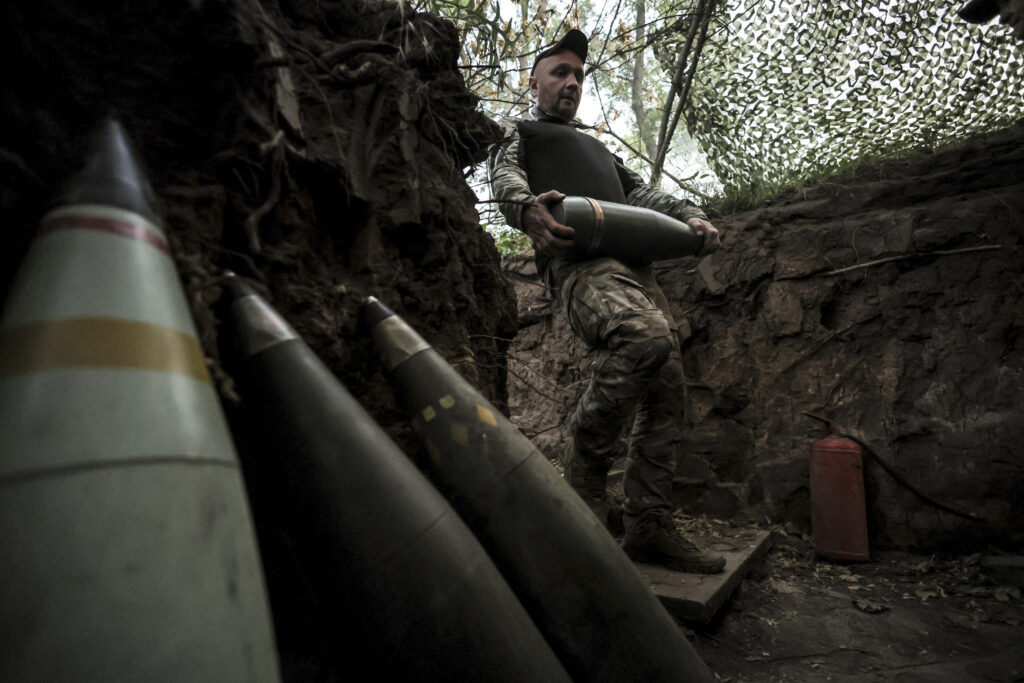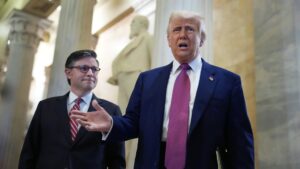
FILE - In this photo provided by Ukraine's 24th Mechanized Brigade press service, a serviceman prepares to fire a howitzer toward Russian army positions near Chasiv Yar, Donetsk region, Ukraine, June 14, 2025. (Oleg Petrasiuk/Ukraine's 24th Mechanized Brigade via AP, File)
Republican lawmakers have expressed strong disapproval of the Pentagon’s decision to temporarily halt military aid to Ukraine, arguing that the move undermines former President Donald Trump’s commitment to bolstering Ukraine’s defense capabilities. The aid freeze, which includes critical weaponry and missile defense systems, has sparked a heated debate in Washington.
The Pentagon’s decision comes at a time when Ukraine is facing increased aggression from neighboring Russia. The suspension of aid, according to critics, could weaken Ukraine’s ability to defend itself and signal a lack of U.S. support for its Eastern European ally. This controversy has reignited discussions about America’s role in global security and its strategic commitments abroad.
Background on U.S. Military Aid to Ukraine
Since Russia’s annexation of Crimea in 2014, the United States has been a key supporter of Ukraine, providing billions of dollars in military aid to help the country defend its sovereignty. This support has included a range of defensive weapons, training, and intelligence-sharing initiatives. Under the Trump administration, the U.S. increased its military assistance, with Trump himself pledging to explore advanced missile defenses for Ukraine.
The current pause in aid delivery, however, has raised questions about the continuity of U.S. foreign policy and its commitment to Ukraine’s security. Some lawmakers argue that the freeze contradicts the previous administration’s promises and could embolden Russian aggression.
Republican Response and Criticism
Leading Republican figures have been vocal in their criticism of the Pentagon’s decision. Senator Lindsey Graham, a prominent advocate for strong military support to Ukraine, stated,
“This pause in aid sends the wrong message to both our allies and adversaries. It undermines the security commitments we have made to Ukraine.”
Other Republican lawmakers have echoed these sentiments, emphasizing the importance of maintaining a robust defense posture in Eastern Europe. They argue that the aid freeze not only jeopardizes Ukraine’s security but also risks diminishing U.S. influence in the region.
Implications for U.S.-Russia Relations
The suspension of military aid to Ukraine could have broader implications for U.S.-Russia relations. Historically, the U.S. has used military aid as a tool to counter Russian expansionism and assert its influence in Eastern Europe. The current pause may be perceived by Moscow as a sign of weakening resolve on the part of the United States.
Experts warn that any perceived reduction in U.S. support for Ukraine could embolden Russia to increase its military activities in the region. According to Dr. Fiona Hill, a former National Security Council official,
“The pause in aid could be interpreted by Russia as an opportunity to test the limits of U.S. commitment to Ukraine’s defense.”
Looking Ahead: Potential Consequences and Next Steps
As the debate over the aid freeze continues, the Biden administration faces pressure to clarify its stance on Ukraine and reassure both domestic and international stakeholders of its commitment to global security. The Pentagon has indicated that the pause is temporary and part of a broader review of U.S. military assistance programs.
Moving forward, Congress may seek to assert its influence over foreign aid decisions, potentially introducing legislation to ensure continued support for Ukraine. The outcome of this debate will likely shape the future of U.S. foreign policy and its approach to countering Russian aggression.
In conclusion, the Pentagon’s decision to pause military aid to Ukraine has sparked significant controversy, highlighting the complex dynamics of U.S. foreign policy and its implications for international security. As lawmakers and experts weigh in on the issue, the world watches closely to see how the United States will navigate these challenges.





